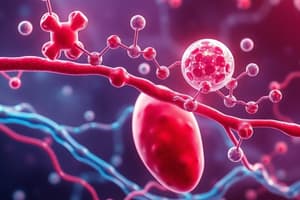Podcast
Questions and Answers
What is the clinical application of bosentan?
What is the clinical application of bosentan?
- To decrease pulmonary vascular resistance in pulmonary hypertension (correct)
- To reduce serum aminotransferase levels
- To treat hypertension by increasing vascular resistance
- To enhance sodium and water excretion in renal failure
What is a significant side effect of bosentan that must be monitored?
What is a significant side effect of bosentan that must be monitored?
- Increased heart rate
- Reduced kidney function
- Elevated serum aminotransferase levels (correct)
- Increased blood pressure
How does Substance P function in the gastrointestinal tract?
How does Substance P function in the gastrointestinal tract?
- As an inhibitor of gastrointestinal motility
- As a vasoconstrictor causing hypertension
- As a regulator of blood glucose levels
- As a local hormone and neurotransmitter (correct)
What is the primary role of nitric oxide in physiological processes?
What is the primary role of nitric oxide in physiological processes?
What effect does calcitonin gene-related peptide (CGRP) have when injected centrally?
What effect does calcitonin gene-related peptide (CGRP) have when injected centrally?
What is the primary action of angiotensin II in the body?
What is the primary action of angiotensin II in the body?
Which of the following are considered vasodilators?
Which of the following are considered vasodilators?
How does vasopressin primarily regulate blood pressure in the long term?
How does vasopressin primarily regulate blood pressure in the long term?
Which substance is used as an antagonist of vasopressin?
Which substance is used as an antagonist of vasopressin?
What effect does angiotensin II have on sodium reabsorption in the kidneys?
What effect does angiotensin II have on sodium reabsorption in the kidneys?
What is a clinical application of ACE inhibitors?
What is a clinical application of ACE inhibitors?
Which mechanism do endothelins utilize to exert their effects on blood vessels?
Which mechanism do endothelins utilize to exert their effects on blood vessels?
What role does neuropeptide Y play in the context of vasoactive peptides?
What role does neuropeptide Y play in the context of vasoactive peptides?
Flashcards are hidden until you start studying
Study Notes
Vasoactive Peptides
- Vasoactive peptides are small proteins that are involved in regulating blood pressure, heart rate and other bodily functions.
- Most tissues use these peptides for cell-to-cell communication.
- They play a significant role in both the autonomic and central nervous systems.
- Vasoconstrictors, known for narrowing blood vessels, include Angiotensin II, Vasopressin, Endothelins, Neuropeptide Y, and Urotensin.
- Vasodilators, responsible for widening blood vessels, include Bradykinin and related Kinins, Natriuretic Peptides, Vasoactive Intestinal Peptide, Substance P, Neurotensin, Calcitonin Gene-Related Peptide, and Adrenomedullin.
Angiotensin II
- A potent pressor agent (40 times stronger than norepinephrine).
- Controls blood pressure through its interaction with the renin-angiotensin-aldosterone system (RAAS).
- It is synthesized by enzymatic cleavage of angiotensin I from angiotensinogen by renin, which is produced by juxtaglomerular cells.
- Angiotensin I is then converted to angiotensin II by converting enzyme.
- It stimulates aldosterone biosynthesis.
- It induces renal vasoconstriction, increases proximal tubular sodium reabsorption, and inhibits the secretion of renin.
- It promotes thirst (dipsogenic effect).
- It contributes to cardiovascular hypertrophy by stimulating the growth of vascular and cardiac muscle cells.
Clinical Applications:
- Aliskiren, an angiotensin II inhibitor, decreases renin activity and blood pressure.
- ACE inhibitors like captopril, enalapril, and lisinopril reduce systemic vascular resistance without increasing heart rate.
- Angiotensin Receptor Antagonists including losartan, valsartan, candesartan, and telmesartan are effective oral medications that specifically block Angiotensin II AT2 receptors.
Vasopressin (ADH - Antidiuretic Hormone)
- Regulates blood pressure in two ways: long-term via water re-absorption in the kidney (V2 receptors) and short-term through vasoconstriction (V1 receptors).
- Used as a nasal spray for nocturnal enuresis in children over 5 years old.
- Conivaptan, a vasopressin antagonist (V1 receptors), is used to treat hypertension and heart failure.
Endothelins
- Powerful vasoconstrictor peptides mainly produced by vascular endothelium.
- Cause a dose-dependent vasoconstriction in most vascular beds.
- Directly increase the force (inotropic) and rate (chronotropic) of heart contractions and are strong coronary vasoconstrictors.
- They constrict blood vessels in the kidneys, decreasing glomerular filtration rate and sodium and water excretion.
- Cause a strong contraction of tracheal and bronchial smooth muscles, impacting the respiratory system.
Clinical Applications:
- Bosentan, a nonselective endothelin antagonist, is effective both intravenously and orally.
- It treats pulmonary hypertension by reducing pulmonary vascular resistance and dyspnea.
- While usually well-tolerated orally, it can increase serum aminotransferase levels in 11% of patients.
- Liver function tests must be monitored at baseline and monthly.
- Bosentan, due to birth defects it caused in animal studies, is contraindicated during pregnancy.
### Vasoactive Intestinal Peptide (VIP)
- Acts as a neurotransmitter or neuromodulator.
- Causes relaxation of blood vessels in most tissues.
- Produces positive inotropic and chronotropic effects.
Substance P
- Important neurotransmitter in the gastrointestinal system, potentially acting as a transmitter in the enteric nervous system and as a local hormone.
- Acts as a potent vasodilator in arterioles causing significant hypotension.
Clinical Applications:
- Aprepitant, a highly selective and effective orally administered receptor antagonist, is used to prevent chemotherapy-induced nausea and vomiting.
Calcitonin Gene-Related Peptide (CGRP)
- Increases blood pressure and suppresses appetite when injected into the central nervous system.
- In peripheral administration, it causes hypotension and tachycardia.
- Plays a crucial role in the development of migraines.
Urotensin
- A potent constrictor of vascular smooth muscle.
Nitric Oxide (Endothelium-Derived Relaxing Factor)
- A gaseous signaling molecule that readily diffuses across cell membranes.
- Regulates a wide range of physiological and pathological processes, including cardiovascular, inflammation, immune, and neuronal functions.
- Its main effect is vasodilation.
Studying That Suits You
Use AI to generate personalized quizzes and flashcards to suit your learning preferences.




